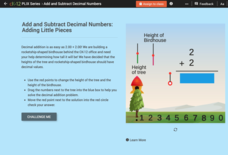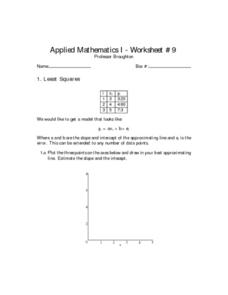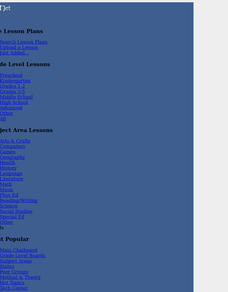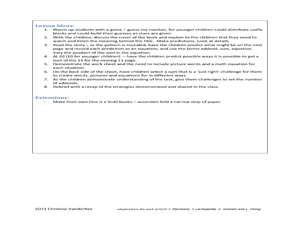5280 Math
Multiplication Table Algebra
Patterns, patterns, everywhere! Young scholars examine the multiplication table to identify patterns. Their exploration leads to an understanding of the difference of squares and sum of cubes by the completion of the algebra project.
Mathed Up!
Forming and Solving Equations
What does geometry have to do with geometry? The portion of a review series for a math assessment highlights how equation formation is assessed on the test. Pupils use geometric concepts such as perimeter and the sum of the measures of...
Illustrative Mathematics
Measuring Blocks
Stack them together to get a measurement. The short activity has pupils work in pairs to measure the lengths of two blocks and then determine the length of the two blocks together. The groups then determine an equation that represents...
Science Matters
Hierarchy
A system is only as good as the sum of its parts! Young scholars explore the components of the different body systems using a hands-on lesson. The lesson helps learners build an understanding that there is a hierarchy of components in...
CK-12 Foundation
Addition of Integers: Number Blocks
A five-question interactive provides a horizontal number line where integers are stacked on top of one another to find solutions of addition problems. Mathematicians move numbers to the numbers line, as numbers build higher, the sum of...
CK-12 Foundation
Decimal Addition: Adding Little Pieces
A five-question interactive test scholars' knowledge of adding and subtracting decimals. A tool aids in problem-solving with movable parts that reveal addends and sums. Question types include one discussion, fill and in the blank, and...
Radford University
How Much is in There? A Polygon Investigation
Try to find the triangles in various polygons. An investigation has learners develop a formula for the sum of the measures of the interior angles of a polygon. They use manipulatives to partition each polygon into triangles, then...
EngageNY
Applying the Properties of Operations to Add and Subtract Rational Numbers 2
The ninth part in a 25-part series emphasizes the importance of using properties of operations in evaluating sums and differences of rational numbers. Pupils solve problems and provide justifications for each step.
SEN Teacher
Arithmetic Maker
With endless possibilities, you can create custom flashcards to take to class as easy as 1, 2, 3! Let this flashcard creator do the work for you, just chose the level of difficulty, add or subtract, and the number of place values. Each...
Scholastic
Study Jams! + and - Without Regrouping
Addition and subtraction are essential skills for all young mathematicians. Explain the step-by-step process with respect to place value using these real-world examples. Focus is on numbers in the tens, hundreds, and thousands, making...
Curated OER
TI-82 PROFICIENCY
Students find the proper factors for numbers one through fifty using either the divisibility laws or TI-82. They determine the sum of the proper factors for each number. If the sum of the factors is less than the number itself, then this...
PBS
Remove One
With a set of 15 chips and a number line, learners predict what sums may occur with the rolling of two dice. When their sum comes up, they remove one of the chips from their number line with the objective of being the first to remove...
Illustrative Mathematics
Operations with Rational and Irrational Numbers
Learners complete addition and multiplication tables that include rational and irrational numbers. They also answer a series of questions about the sums and products of irrational and rational numbers. One suggested modification would be...
Curated OER
Countdown Challenge: Tricks for Finding Multiples of 3 and 4
In this tricks for finding multiples worksheet, students explore rules of divisibility. They compute the sum of the digits to determine if a number is divisible by three. Additionally, students identify the last two digits of a number to...
Curated OER
Butterfly Addition: Color by Numbers
Children learning to add numbers up to 11 develop the strategy of using the larger number as the first addend and counting on from there to find a sum. They define addition and review the meaning of the plus (+) symbol. To practice, they...
Curated OER
Operations on Polynomials
Students simplify and reduce polynomials. For this algebra lesson, students find the sum, difference, product and quotient of polynomials and monomials. They use the order of operation correctly.
Curated OER
Least Squares
In this least squares learning exercise, students solve 6 different problems that include the least squares of numbers. First, they plot 3 points on the axes shown and draw in their best approximating line. Then, students estimate the...
Curated OER
Adding: Written Questions
Sometimes, written addition problems can confuse students. In this addition worksheet, students find sums for 10 written questions such as: "Find the sum of 30 and 50."
Illustrative Mathematics
Egyptian Fractions II
The Egyptians used unit fractions to describe all other fractions. Your class will rewrite rational expressions in order to deduce information about rational numbers. The activity starts with specific fractions, guides you through a few...
Curated OER
Ring Toss Math
Young mathematicians play Ring Toss Math to find sums and differences to 18. If you're looking for an engaging, in-class game to help reinforce these mathematical concepts, this lesson could be for you!
Curated OER
Math Worksheets - Magic Squares
In this magic squares worksheet, students find the magic number in each of the 4 magic squares. Each of the magic squares is completely filled so that students only have to find the common sum in each puzzle.
Curated OER
Book Title: One is a Snail, Ten is a Crab
Students read a story and write math problems. In this reading and math comprehension lesson, students preview and read the book "One is a Snail, Ten is a Crab". Students predict ways to get a sum of 11, write math equations...
Ohio Resource Center
Egyptian Fractions
What is an Egyptian Fraction? Print this sheet as a bell-ringer activity. Budding mathematicians solve three short answer problems. They write three fractions as unit fractions so that the numerator is one and the sum is equal to the...
Curated OER
More Addition
Turn your mathematicians into addition superstars with these multiple-addend equations. They add up three, four, and five-digit numbers to find the sums, a few of which are six-digit numbers. The twelve vertically aligned equations...
Other popular searches
- Estimating Sums
- Estimating Number Sums
- Partial Sums
- Sums of 10
- Addition Partial Sums
- Sums of 8
- Sums to 5
- Estimating Sums Differences
- Calculating Sums
- Estimating Sums of Fractions
- Color by Sums
- Multiplication Sums























